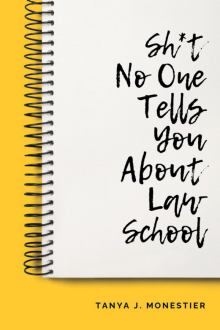Lessons inside and outside of the classroom
Tanya Monestier, Professor of Law
Professor Tanya Monestier’s students agree on one thing – she expects and delivers excellence in the classroom. It’s evident by the comments in their end-of-year reviews:
“Professor Monestier is one of the toughest but fairest professors I have had here so far. She doesn’t hide the ball, she wants you to understand the material, succeed in her class, and she wants you to grow as a legal thinker.”
“She makes you work hard but tells you how to work hard. She teaches us to be better students, better future lawyers, and all around better critical thinkers.”
“Professor Monestier was my FAVORITE professor and I am so excited to take classes with her next year. She has VERY high expectations, but I think that made me a better student.”
Monestier joined the UB School of Law faculty this fall from Roger Williams University School of Law, in Rhode Island. There she was named Professor of the Year by one graduating class, and received the honors Distinguished Teaching Professor of Law and Distinguished Research Professor of Law.

Purchase Monestier's book "Sh*t No One Tells You About Law School" from Caroline Academic Press.
Follow Monestier on Twitter @TanyaMonestier.
She holds an LL.M. from the University of Cambridge in England and an LL.B. from Toronto’s Osgoode Hall Law School. At UB Law, she’ll teach courses in Contracts, Sales and Transnational Litigation.
Her new faculty appointment is a homecoming of sorts. Monestier grew up in Toronto, the daughter of parents who immigrated from Italy. (To honor that heritage, she spent part of her Osgoode Hall education at the University of Bologna, studying comparative Italian law.) She taught at Roger Williams since 2009, but now she’s a quick drive up the QEW from her hometown. “My parents are beyond thrilled,” she says.
Monestier’s research interests have centered around issues of the law of jurisdiction, first in Canada and more recently in U.S. cases. Her law review articles have been widely cited, including by the Supreme Court of Canada. Her 2015 article in the Cardozo Law Review, “Registration Statutes, General Jurisdiction, and the Fallacy of Consent,” has been cited in dozens of cases, including a citation in the Second Circuit Court of Appeals. The U.S. Supreme Court has agreed to hear a case involving the issue presented in her article, and Monestier just submitted an amicus brief to the high court.
As her students’ comments suggest, Monestier is a no-nonsense presence in the classroom. “My classes are pretty intense,” she acknowledges. “Last year I decided to try teaching with PowerPoint, and I discovered I didn’t like teaching like that. It felt inorganic. I’m a better teacher when it’s just me and you and the blackboard behind me. There’s no filler. We start and we end, and students’ heads hurt, but the learning gets done. … If you are who you are in the classroom, students respect that. And I’m just not that entertaining.”
So she says—except that her new book for Carolina Academic Press, Sh*t No One Tells You About Law School, reflects a very different voice. In language that law students will likely recognize, and with the wisdom of her own experience on both sides of the lectern, Monestier lays out a litany of no-nonsense guidance on how to thrive in law school. Sample chapters: “Your Professor Is Not Your Mom,” “Almost Everyone Has Imposter Syndrome,” “Case Briefs Are Overhyped” and “Don’t Be a Tool.”
“I didn’t want to take the approach, ‘I’m the professor and let me tell you what to do’,” she says. “I wanted to write it in a way that was entertaining and would relate to students through stories and my own personal experience. Sometimes you get through to students better when you’re not lecturing them.”
To promote the book, she has done a few podcasts and other interviews. And word-of-mouth is quickly escalating among law students. “The feedback from students so far is that they’ve loved it,” she says. “It’s making them think more deliberately about law school and how they make decisions.”
